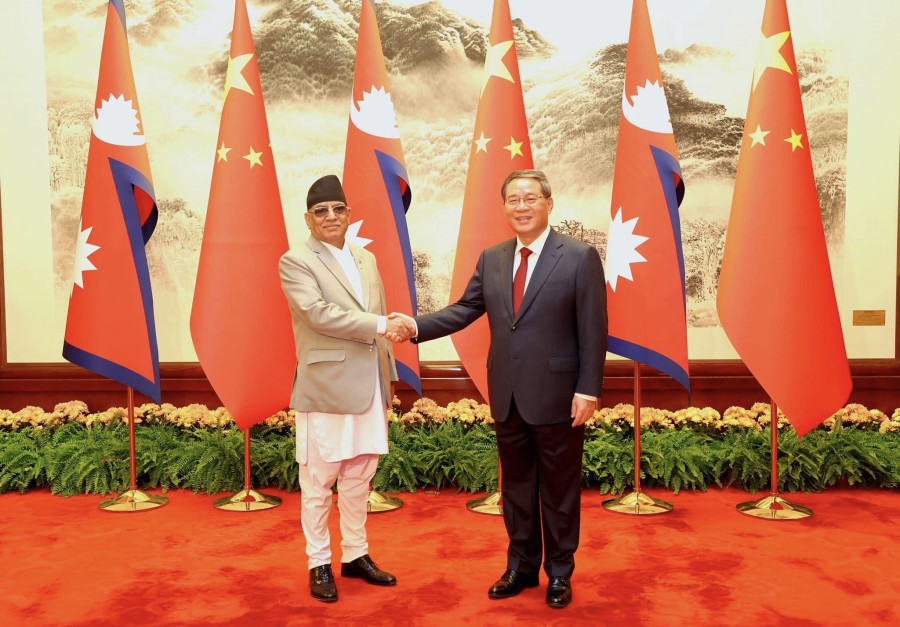National
Nepal, China sign 12 agreements, but none under BRI
Nepali embassy says Dahal and his Chinese counterpart ‘comprehensively’ reviewed the state of bilateral relations.
Anil Giri
As Prime Minister Pushpa Kamal Dahal wrapped up his political and official engagements in China during his week-long visit, the two countries on Monday signed a dozen agreements and memorandums of understanding. But none of the agreements involved Belt and Road Initiative (BRI) projects.
The prime minister was expected to iron out key differences over expediting BRI projects, cross border energy trade and implementation of past agreements and accords, among others, as he had publicly committed to before leaving for China. But these issues were noticeably absent in the agreements signed on Monday.
The agreements and memorandums of understanding were signed following delegation-level talks between Dahal and his Chinese counterpart, Li Qiang.
Some expectations raised by the prime minister himself and some commitments he made in Parliament and during his public speeches will be reflected in a joint communiqué, a Nepali official told the Post from Beijing.
“We have made some good understandings and the visit has set the tone for carrying forward some good projects,” the official said.
During the talks, the two prime ministers ‘comprehensively’ reviewed the state of friendly bilateral relations and expressed satisfaction at the close and cordial relations between the two countries, said a statement issued by the Nepali Embassy in Beijing.
The two sides exchanged views strengthening and consolidating bilateral ties, with an emphasis on enhancing cooperation on economy, trade, and people-to-people contacts.
But there is no statement from the Chinese side regarding the meetings and understandings signed on Monday.
“Some more understandings have been reached including finalisation of Nepal-China Electric Power Cooperation Plan, joint inspection of Nepal-China boundary, early finalisation of the implementation plan of the Belt and Road, one of a most hyped agenda item of the visit, joint development of an agriculture industrial demonstration park, among other things. These will be included in the joint communique,” said the official.
Dahal is currently visiting China at the invitation of Chinese Premier Li Qiang. He held talks with Chinese President Xi Jinping on Saturday in Hangzhou, on the margins of the 19th Asian Games.
After the delegation level talks between Dahal and Li in the Great Hall of the People, 12 agreements including MoUs were signed, according to the Nepali side.
Those agreements signed on Monday include an MoU on cooperation between China's National Development and Reform Commission and Nepal’s National Planning Commission, and another on enhancing cooperation on the digital economy. Yet another MoU is on cooperation between China’s National Development and Reform Commission and Nepal's Ministry of Forestry and Environment for green and low carbon development. There are also agreements on cooperation for the development of agriculture, livestock and fisheries, and formation of a joint technical working group to review and amend the China Nepal Trade and Payment Agreement signed in 1981.
Additionally, the two sides also signed a Protocol of Phytosanitary Requirements for Export of Plant-derived Medicinal Materials for Chinese Medicine from Nepal. An agreement has also been reached between the Chinese Department of Press and Publication and the Ministry of Culture, Tourism and Civil Aviation to translate and publish classical texts.
Likewise, an MoU on Production and Living Materials for the Northern Hilly Region of Nepal signed between Nepal and China six years ago, was exchanged between the Nepali and Chinese officials.
Similarly, Nepal’s Ministry of Education, Science and Technology and the Ministry of Science and Technology of China have agreed to cooperate in the fields of science, technology and innovation. Also, an MoU was signed on disaster materials, human resources, and construction of the Hilsa-Simkot road.
Both sides also reached an agreement on the construction of Nepal-China Power Grid Interconnection Project (Chimile-Kerung) which is a 220 kV cross-border transmission line and will be built through Chinese grant.
Officials said a joint communiqué that is still being discussed between the Nepali and Chinese sides will shed further light on all the agreements reached during the visit.
“I see nothing more than formality,” said Mahendra Bahadur Pandey, former Nepali Ambassador to China. “This shows how hollow we are and that we have no idea about how to deal with a great power like China.”
“I don’t see any plan, vision or strategy on how to present ourselves to the Chinese side. The agreements reached today are no more than formalities enacted during the visit of the executive head of a close neighbour to another. We did not prepare enough for the visit. What are the crucial areas we can cooperate on with China? How do we execute past agreements?” said Pandey.
“Nepal is clearly having a tough time balancing its geopolitical interests,” said Ganesh Adhikari, former chief of the National Intelligence Department. “The country is in a geopolitical quagmire as it struggles to maintain a non-aligned foreign policy in line with the constitution.”
Nepal must have a strong non-aligned foreign policy, not only in theory, but also in practice in order to survive in the changing world order, Adhikari added.
“If we don’t strengthen our diplomatic capability and apparatus, no one is going to trust us. Lack of diplomatic capacity and non-adherence to non-alignment are the major failings of Nepal’s international relations. Our leaders should understand that we cannot make everyone happy. This kind of confusion and dilemma are clearly reflected in Nepal’s foreign policy conduct, which is evident in this visit,” said Adhikari.




 13.12°C Kathmandu
13.12°C Kathmandu














